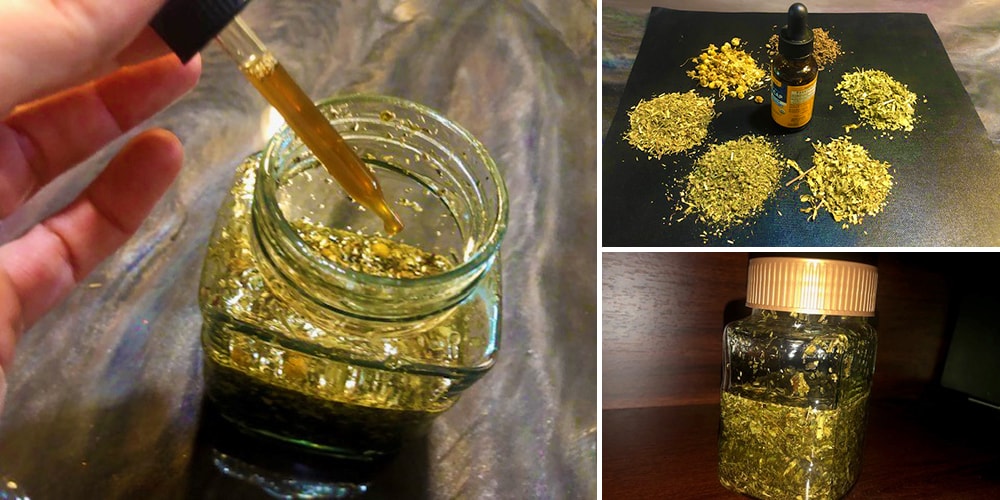
The Nerve Soothing Remedy You Need on Hand
“You’re getting on my nerves” is a common phrase you’ve likely uttered a time or two without much thought about what it means. Of course, when you say it, you mean someone or something is aggravating you.
It can be challenging to control how you react to stress. And if you’re like me, you might need the equivalent of a ‘chill pill’ every once in a while, for the sake of your overall health—and maybe those you love too.
However, the side effects of traditional pharmaceuticals often seem far from worth it to anyone who cares about them. Moreover, finding a store-bought supplement that does the trick can be difficult.
That’s where making a natural nerve soothing remedy can come in handy. And all you need is a few good herbal nerve relaxers and a solvent to do it. I’ll share my recipe in just a moment. But, like always, it’s best to understand the bodily processes behind stress to truly understand how these herbs work, which is the responsibility of anyone who takes herbs and makes herbal remedies.
How Your Nerves Affect Your Mental and Physical Health
We know through epigenetic research that the mind and body connect. That means that your whole body is affected by mental stress and vice versa. This is partly because of the vast neural network humans have.
Millions of neurons span your entire body, and approximately 86 billion are in your brain. Your nervous system has a big job as it’s connected to and communicates with every other part of your body, and in your brain lies the command center, which is responsible for everything from talking and walking to feeling, learning, remembering and even breathing.
 However, stress of any kind, be it physical or mental, can cause your nerves to overfire, impairing your ability to calm yourself down and causing anxiety. Worse, the more this happens, your brain assembles new neuro-pathways that tell your body this is how you should react from now on, thus begging the tug of war between the subconscious and conscious mind. Herbalists, functional MDs and holistic practitioners will often prescribe herbs known as “nervines” to help calm nerves naturally.
However, stress of any kind, be it physical or mental, can cause your nerves to overfire, impairing your ability to calm yourself down and causing anxiety. Worse, the more this happens, your brain assembles new neuro-pathways that tell your body this is how you should react from now on, thus begging the tug of war between the subconscious and conscious mind. Herbalists, functional MDs and holistic practitioners will often prescribe herbs known as “nervines” to help calm nerves naturally.
Additionally, adaptogens can be combined with nervines to enhance their effectiveness. Adaptogens are a class of herbs that support our bodies’ reactions to stress. Popular adaptogens include holy basil, reishi mushrooms, ashwagandha, and ginseng, to name a few, and any of these can be used in this natural nerve support recipe. I personally used ashwagandha.
Nervines can be categorized into two groups:
- Nervines that provide nourishment and support for the neurological system. Examples include Albizia, Bacopa, Milky Oats and Skullcap.
- Nervine relaxants help calm the nerves. Examples include California Poppy, Catnip, Chamomile, Hops, Kava, Lavender, Lemon Balm, Passionflower and Valerian.
⇒ Get your own California Poppy, Lavender and Chamomile here.
To properly support nervous system health, we will combine both kinds of nervines and an adaptogen for our soothing nerve remedy. You may be surprised to see herbs like catnip among these relaxants.
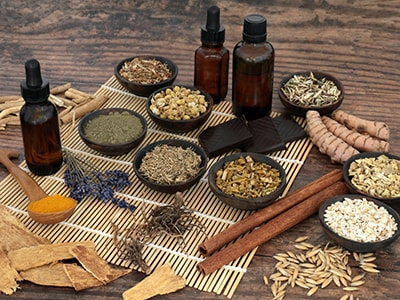
Many people know that catnip stimulates and provides a euphoric effect in felines. In humans, catnip is considered a relaxant. Lemon balm is a relative of catnip, and both are members of the mint family with similar properties. Yet, lemon balm is as gentle as it is effective and can be used for children as well. Plus, it tastes great!
Passionflower is also known for its ability to reduce blood pressure and alleviate cerebral fullness and excitement while promoting restful sleep, while skullcap restores and tones the nervous system. Valerian root is so much of a relaxant that it was used in World War 2 during air raids to facilitate a much-needed emotional hiatus. Both Chamomile and California Poppy help soothe nerves, and you’ll get an added pain-relieving effect from the Poppy too.
Note: While California Poppy is a type of Poppy, it’s much milder than the one used by pharmaceutical companies to make pain medication. However, this herb and others in this recipe can cause drowsiness and shouldn’t be used before operating a vehicle or heavy equipment. It’s best to take this nerve soothing remedy while resting at home.
Herbal Solvents
You can use alcohol, apple cider vinegar or food grade vegetable glycerin as solvents for your tincture. Vinegar tinctures last for about a year and do taste like vinegar. It’s best to use raw organic apple cider vinegar with the mother. Vinegar tinctures are made the same way as alcohol tinctures, but they have a much shorter shelf-life – up to a year – and are recommended to be refrigerated. Alcohol tinctures last 3-5 years, or more if stored properly in a cool, dark location.
However, glycerin tinctures absorb more slowly. Those who don’t want to use alcohol or vinegar can also opt for this solvent. Glycerin tinctures last about 2-3 years. To use glycerin, follow the same steps as the alcohol tincture, except filling your jar one-third of the way full of scalding hot water. Then fill the jar the rest of the way with organic vegetable glycerin and continue to the next step.
So, let’s put it all together, shall we?
How to Make a Nerve Soothing Remedy
To make your herbal nerve tonic, you will need a few ingredients.
Firstly, a solvent like Vodka or other alcohol that’s at least 80% proof alcohol.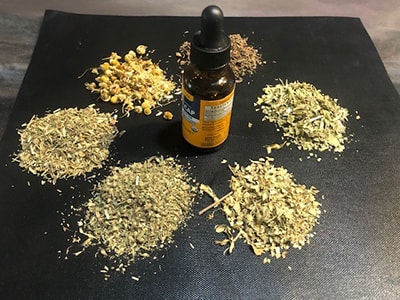 , and 1 tablespoon of each of the dried herbs below:
, and 1 tablespoon of each of the dried herbs below:
- Catnip
- Lemon balm
- Chamomile flowers
- Passionflower
- California poppy
- Ashwagandha
- 20 drops of skullcap extract
You will also need cheesecloth, a jar with a lid, and a dark dropper bottle to keep your tincture in.
Step 1. Measure out all of your dried herbs. 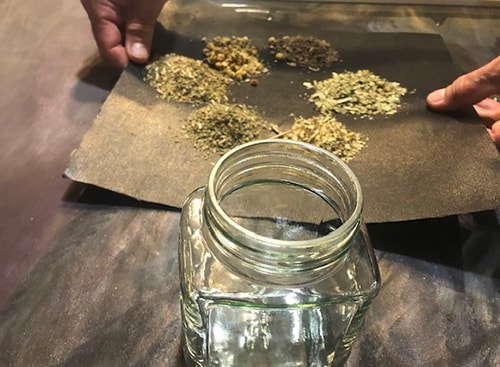
Place the herbs in your jar.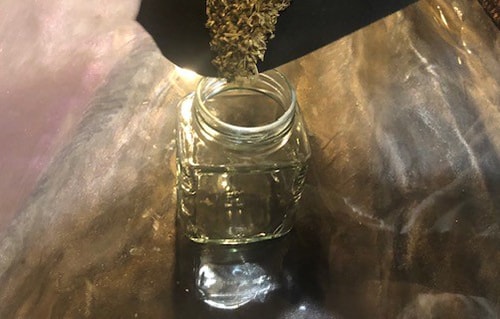
Step 2. Pour your solvent over the herbs until fully immersed.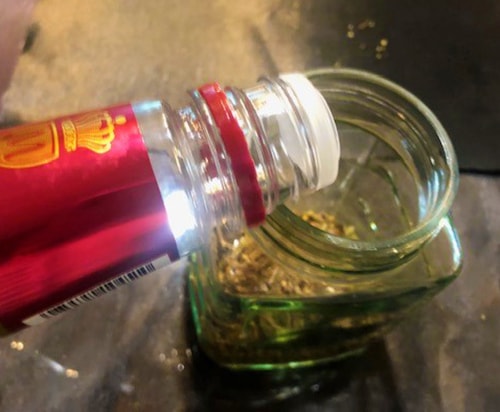
Step 3. Add 20 drops of liquified skullcap extract to the jar. You can also use one tablespoon of dried skullcap instead.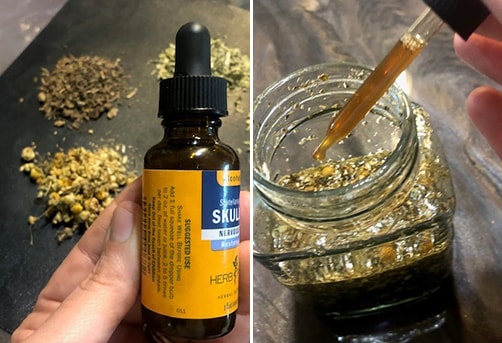
Step 4. Place your natural nerve tincture in a cool, dark cabinet for at least six weeks, shaking it every couple of days. The longer it sits, the stronger it will get. If it becomes dry, you can pour more solvent.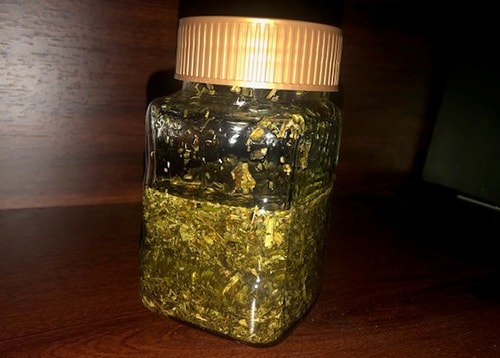
Step 5. After six weeks, strain the contents of the jar through a cheesecloth.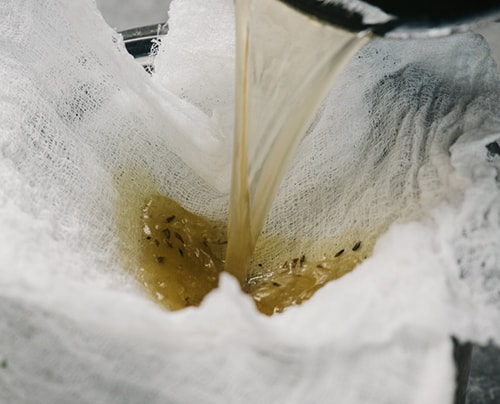
Pour the tincture into a dark dropper bottle for storage.
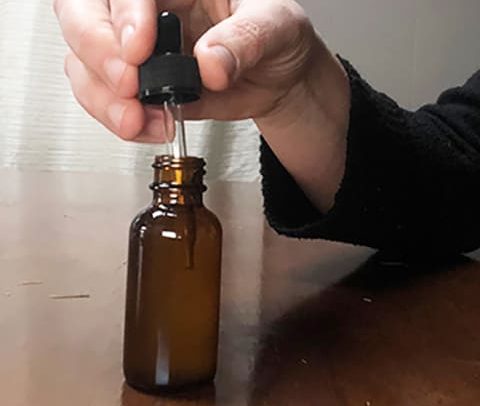
Dosage: Take 10-20 drops as needed up to three times a day. Add it to your tea or water, or directly under the tongue for faster absorption.
Final Thoughts
This easy-to-follow recipe for calming your nerves will have you feeling relaxed in no time. So, say goodbye to stress-induced woes and embrace the gentle power of nature’s nerve-soothing herbs, keeping you centered and balanced every step of the way, for a healthier and more peaceful life.

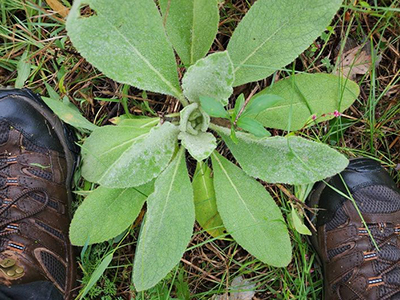
Is catmint the same as catnip?
Hi Katie,
Catmint and catnip are related plants within the same genus, but catnip specifically refers to Nepeta cataria, which has a notable effect on cats. Other Nepeta species may be referred to as catmint, and they may have similar qualities but might not necessarily induce the same response in felines. They do share some similarities in terms of their medicinal benefits for humans, but they may have different concentrations of active compounds and, therefore, slightly different effects.
Many blessings and good health!
Do you have to worry if you are currently taking antidepressants? I’m thinking about the interactions like st John’s wort and serotonin syndrome.
Hi Alyxis,
You should always be cautious when taking medications and herbs at the same time.
Combining these herbs with antidepressants, especially selective serotonin reuptake inhibitors (SSRIs), serotonin-norepinephrine reuptake inhibitors (SNRIs), or other medications that affect neurotransmitter levels, could lead to adverse effects or unexpected interactions. These interactions might manifest as increased or decreased drug effects, an exacerbation of side effects, or other health risks.
Many blessings and good health!
I am immunocompromised and taking meds for it. Will the tincture affect negatively my condition?
Hi Florenda,
If you are taking medication to boost your immune system or manage immune-related conditions, it is essential to approach the use of herbal remedies with caution and consult your healthcare provider before incorporating them into your treatment plan. Herbal remedies, like any other medications, can interact with prescription drugs, including those that affect the immune system.
Many blessings and good health!
Is there a good brand that you recommend for the skullcap extract?
Hi JoAnn,
Thank you for your interest in this remedy!
Although we cannot recommend a specific brand, you can find skullcap extract in most health food stores or online herbal shops.
Many blessings and good health!
do you sell this it would cost me more to make
I am so amazed at your knowledge of herbs. Thank you so much for posting all of your goodies. I only wish I lived next door to you. I have your book and love it. God bless you for all you do.
What’s a good replacement for ashwaganda? I’ve tried it several times and it causes agitation and aggression in me.